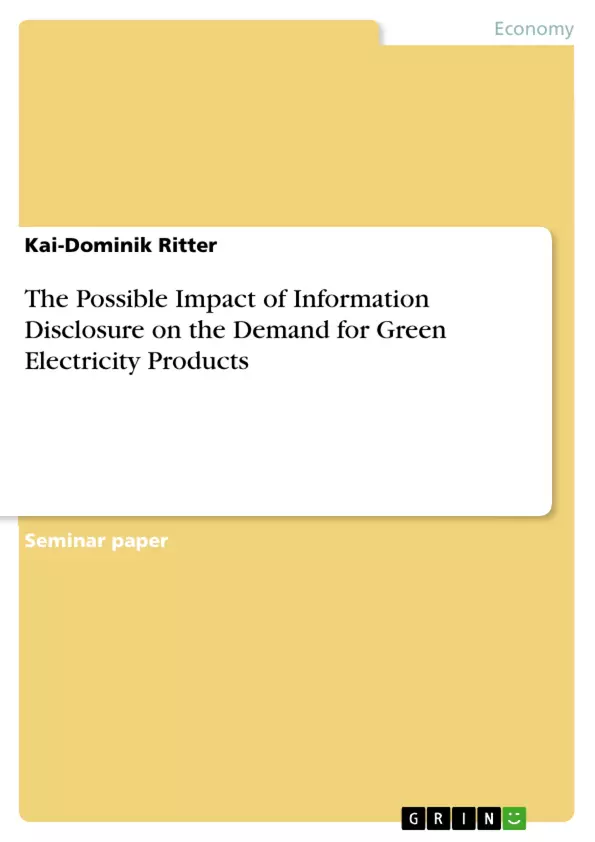This paper tries to analyze electricity markets from the point of view of standard microeconomic theory.
The research paper focuses on the question what role information distribution and information disclosure play for the demand for green electricity products. In the first part of the paper there are several assumptions made about the characteristics of electricity markets and about electricity as consumption good. In the second part the role of information disclosure is evaluated and empirical evidence discussed.
Inhaltsverzeichnis (Table of Contents)
- Introduction
- Characteristics of the electricity market
- General assumptions for the analysis
- Electricity as a consumption good
- Consumer's preferences
- Electricity Markets Now and Then
- Economic theory prediction and empirical findings
- Supply side
- Demand side
- Empirical findings
- General assumptions for the analysis
- The role of information disclosure
- Intuition: How could asymmetric information arise in electricity markets?
- What are the consequences of asymmetric information distribution for the demand for green energy?
- Research on consumers' information demand
- Recommended characteristics of information disclosure schemes
- Theoretical requirements
- Empirical examples
- Conclusion
Zielsetzung und Themenschwerpunkte (Objectives and Key Themes)
This paper aims to analyze the role of information disclosure in influencing consumer demand for green electricity products within the context of the German electricity market. It seeks to understand how asymmetric information can arise in this market and how this information distribution impacts the demand for green energy. Key themes explored in the paper include:- The characteristics of electricity as a consumption good and its specific features within the German market.
- The impact of asymmetric information on the demand for green energy products.
- The importance of information disclosure in promoting the adoption of green energy technologies.
- Recommended characteristics of information disclosure schemes to effectively inform consumers about green electricity options.
- Empirical evidence and research findings related to consumer information demand and its effects on market behavior.
Zusammenfassung der Kapitel (Chapter Summaries)
- Introduction: This chapter provides an overview of the paper's scope and its relevance in the context of Germany's energy policy shift towards renewable energy sources following the Fukushima nuclear disaster. It highlights the importance of both technology development and consumer demand for green energy products in achieving the government's energy goals.
- Characteristics of the electricity market: This chapter outlines the key assumptions and characteristics of the German electricity market, focusing on the specific features of electricity as a consumption good and the different types of electricity products available. It explores the complex structure of the electricity market and discusses the role of information distribution in influencing consumer choices.
- The role of information disclosure: This chapter delves into the concept of asymmetric information in the electricity market, exploring how it can arise and its consequences for the demand for green energy. It examines the importance of information disclosure in addressing asymmetric information and outlines the theoretical requirements for effective information disclosure schemes.
Schlüsselwörter (Keywords)
The paper focuses on the following key terms and concepts: green electricity products, information disclosure, asymmetric information, demand for green energy, consumer preferences, electricity market characteristics, renewable energy sources, and energy policy in Germany. It explores the interplay of these elements in understanding the adoption of green energy technologies and the role of informed consumer decision-making in shaping the future of the German energy system.Frequently Asked Questions
What is the main focus of this research paper?
The paper analyzes how information disclosure and asymmetric information distribution affect the demand for green electricity products in the German market.
How does asymmetric information affect green energy demand?
Asymmetric information occurs when consumers lack clear data about energy sources, which can lead to lower trust and decreased demand for premium green products.
Why is the Fukushima disaster mentioned in the context of this study?
The Fukushima disaster triggered a significant energy policy shift in Germany towards renewable sources, making consumer demand for green products more critical.
What are the recommended characteristics for information disclosure schemes?
Effective schemes should be transparent, standardized, and easily understandable to help consumers make informed choices between different electricity products.
Is electricity considered a standard consumption good?
The paper analyzes electricity as a consumption good using standard microeconomic theory, but notes its specific features like invisibility and necessity.
- Arbeit zitieren
- Kai-Dominik Ritter (Autor:in), 2013, The Possible Impact of Information Disclosure on the Demand for Green Electricity Products, München, GRIN Verlag, https://www.grin.com/document/233668



